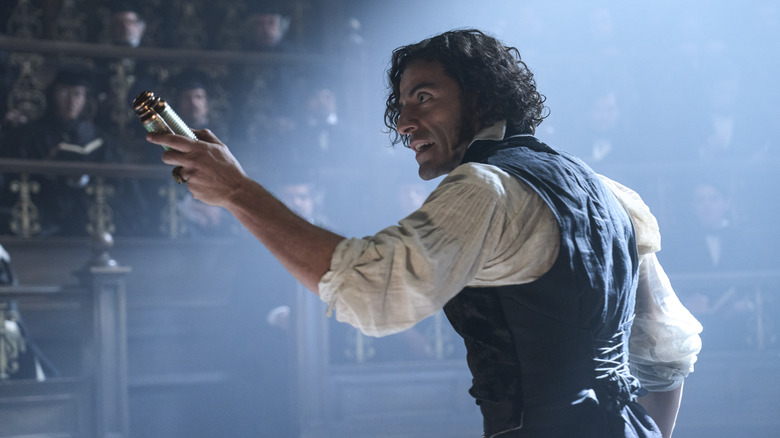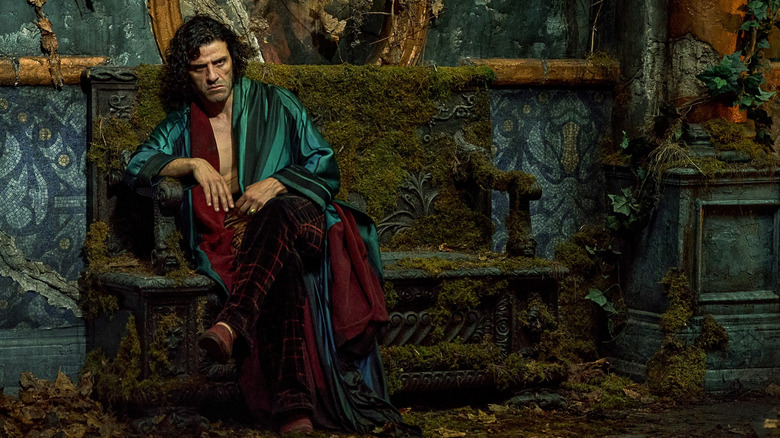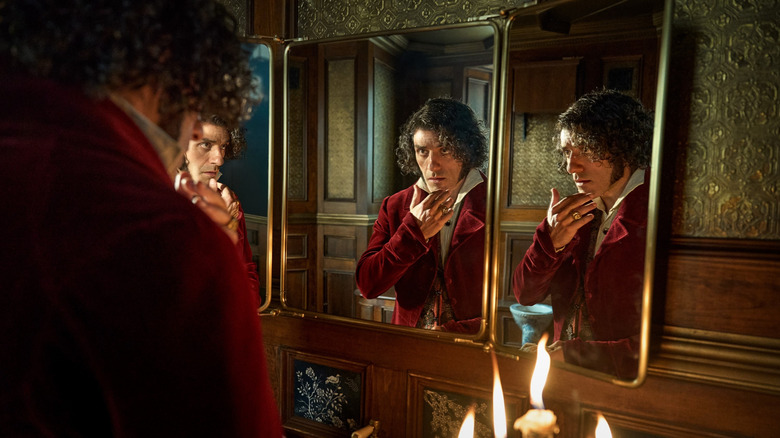One Thing Sets Oscar Isaac's Victor Frankenstein Apart From All Previous Versions
It's nothing new to suggest that Victor Frankenstein, the titular doctor at the heart of Mary Shelley's 1818 Gothic novel "Frankenstein; or, The Modern Prometheus," is the real monster in the story, and yet no adaptation seems to have fully contended with that idea — until now. In Guillermo del Toro's "Frankenstein," Victor (Oscar Isaac) is a toxic and self-centered man-child with enormous daddy issues who sips milk and sulks with abandon, and he's by far the most plainly villainous version of the doctor to date. There isn't a shred of sympathy for Victor in the film, and while we could argue until the end of time about what Shelley actually thought about her troubled protagonist, del Toro's take cuts to the core of the character and elaborates on the themes Shelley set into motion.
It's understandable that creatives have identified with Victor Frankenstein throughout the years, with most adaptations seeming to paint him as a tragic hero. After all, what creative can't relate to the insatiable drive to make something? In these adaptations, he's an unconventional genius whose greatest flaw is his obsession, but there still seems to be an appreciation for his passion and mind. Even in Kenneth Branagh's 1994 film "Mary Shelley's Frankenstein," which hews closest to Shelley's actual text than any other adaptation, Victor (Branagh) does a number of frustrating things but is never held to account for any of them (save for the final comeuppance courtesy of his creation), likely in part because Branagh was too close to the character himself as an actor and director. By making Victor the true villain of "Frankenstein" and refusing to give him leeway for his actions, del Toro has helped cinema to finally do Shelley justice.
Oscar Isaac's Victor Frankenstein is an abusive jerk
While del Toro made some pretty massive changes in adapting "Frankenstein," both streamlining the tale and giving its characters more agency, one of the biggest changes people have latched onto is his movie's total lack of sympathy or even appreciation for Victor. Oscar Isaac is a beautiful man and he's dressed impeccably throughout the film, but he's such a scowling, self-centered misanthrope that he's truly monstrous. When contrasted with his younger brother, William (Felix Kammerer), his brother's fiancée Elizabeth (Mia Goth), or even his own creation (Jacob Elordi), his monstrosity becomes all the more apparent. In his version of "Frankenstein," del Toro addresses the pain that fathers can cause their children, and Victor is the ultimate bad dad. He's taken the pain caused by his own father (Charles Dance) and passed it onto his creation, continuing a chain of abuse and disappointment. He even tries to steal Elizabeth away from William, believing that he's in love with her when really she's just another of his obsessions.
The first half of the story is told to us by Victor, and so we see it (somewhat) from his perspective, but when we hear the creature's tale, it only confirms that Victor has always had one obsession that mattered above all others: himself. He isn't the indecisive Hamlet or ambitious Macbeth; instead, he's just an unrepentant narcissist who couldn't change even after achieving his goal and realizing it was a mistake. While Shelley seemed to criticize Victor for his desire to create life and go against the divine law of creation, del Toro instead criticizes him for what he does after he creates life. After all, what's the point in being a father if you're not going to be a good one?
In Frankenstein, the only thing that matters to Victor is Victor
Though it may seem like Victor's primary obsession is with defeating death and creating new life, it's all based in his deep need to bring his own dead mother (also Goth) back because she was the only one who ever gave him the validation he needed. There is no replacing his mother, try as he might by sipping on milk or forcing Elizabeth into a version of that role, and so this sad little mama's boy focuses every ounce of his genius and passion on himself. He needs to prove his haters wrong and make a name for himself, ethics and moral integrity be damned. His goal isn't some altruistic one; it's purely selfish, and it fits Shelley's depiction of both the character and some of the men in her actual life.
The final shot of del Toro's film is a quote from Shelley contemporary Lord Byron, which has incensed some viewers but actually fits perfectly with this version of "Frankenstein." Shelley was only 18 years old when she wrote "Frankenstein," and she famously did it while trapped by bad weather in an estate with not only the obnoxious Byron but also her future husband and fellow terrible man, Percy Shelley (with whom she was having an affair), and writer and physician John Polidori. There's more than a little of Lord Byron and Percy Shelley in del Toro and Isaac's take on Victor, and it gives us an insightful, fresh perspective on a character that's otherwise been done to death. Shelley's own life was one where men were often monstrous, and reflecting that in an irredeemable Victor Frankenstein makes del Toro's take that much more powerful.
"Frankenstein" is now streaming on Netflix.


